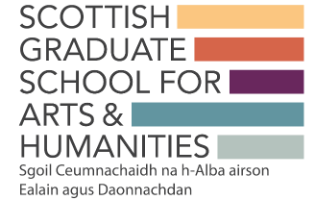Cohort Development Fund
The Cohort Development Fund allows SGSAH to support unique initiatives directed towards supporting the disciplinary and interdisciplinary training needs of doctoral researchers in the Arts & Humanities.
The Cohort Development Fund aims to support SGSAH doctoral researchers to work collaboratively to develop and improve doctoral training across Scotland, by funding them to:
- develop/deliver training that is not possible/viable for individual institutions and is in the vanguard of the field(s);
- develop/deliver accessible training that is innovative in scope, subject and/or delivery model;
- lead the development of research training in their discipline(s);
- develop strong, sustainable and inclusive peer networks among SGSAH researchers;
- build capacity among the student body to identify, lead, manage and/or deliver their own training;
- develop doctoral researcher capacity in grant proposal writing.
| Submission deadlines | 31 May 2024 | 25 October 2024 | 31 January 2025 |
Please note: we are welcoming proposals for online, in-person or hybrid delivery for 2023-24.
Projects Funded
Here are some previous events and initatives that have been funded through the Cohort Development Fund:
- 'Hand on the treasure troves': exploring archives and sharing experiences in an informal setting
- PhD Blogging for Beginners: a bootcamp of multimedia content production to increase your research impact
- Ethical Engagement: a 3-part series of online workshops
- Decolonial Feminist Ecologies: exploring gendered landscapes of body, migration, and climate
Who can apply?
Doctoral researchers in arts and humanities at SGSAH member HEIs can apply for Innovative Doctoral Training funds. We expect that Collaborative Doctoral Training Network applications will be led by staff members, and include doctoral researchers as organisers and/or participants.
How do I apply?
Please select the relevant application form to download (see above right). Complete and return it to admin@sgsah.ac.uk by the deadlines shown above.
Innovative Doctoral Training Events
The SGSAH and its Discipline+ Catalysts are keen to support innovative and accessible ideas and encourage applicants to be creative in their submissions. Types of activity might include:
- Online workshops
- Online masterclasses
- Online seminars
- Online talks from visiting/external speakers
We expect to fund no more than £2,500 per application, however we advise you to contact the relevant Catalyst Lead(s) before making an application. They will be able to advise you of appropriate funding levels, which will depend on the scope and reach of your proposed event.
Events must:
- Demonstrably meet the aims set out above
- Have potential for scalability/replicability
- Include at least three SGSAH institutions in planning and/or delivery, with a single named lead HEI
- Be aimed at a minimum of 10 doctoral researchers
- Must be advertised openly to all SGSAH doctoral researchers
- Include costs for reimbursing travel for doctoral researchers attending an event if relevant. All travel, including that of visiting speakers, can only be reimbursed at standard class and normally at advance ticket rates and that SGSAH institution staff salary and travel costs are not eligible. Please note: we are welcoming proposals for online, in-person or hybrid delivery for 2023-24.
Collaborative Doctoral Training Networks
This funding will enable groups of staff and doctoral researchers to work together to identify doctoral training needs and develop a costed plan to meet them. These groups may be disciplinary, thematic or inter-disciplinary. If appropriate, and in light of government guidance to the COVID-19 pandemic, funding of up to £300 may be available to support travel and associated expenses (e.g. room hire, catering) to enable the development of a plan for doctoral training in a specific area. Applications should be led by HEI staff, however it is essential that doctoral researchers are involved as participants. They may also be involved as part of the organising team.
Further guidance for applicants
Successful CDF proposals are likely to:
- Be clearly and simply written, avoiding jargon;
- Be specific about the proposed training outcomes and how these will be achieved through the inclusive and accessible training method proposed;
- Articulate the contribution to the training of the participating HEIs;
- Have considered the Scottish landscape in the relevant field(s) and sought to involve relevant SGSAH partners;
- Be realistic about what is achievable within time limits, particularly where these have already been set e.g. by other events to which the training is linked;
- Where the training is attached to an existing event or network, articulate clearly the added value provided by the training;
- Where the proposal is student-led, to have engaged with supervisors and/or other HEI staff for advice and guidance;
- Have carefully considered the approach to measuring impact and evaluation, seeing it as an integral part of the training, rather than an add-on.



